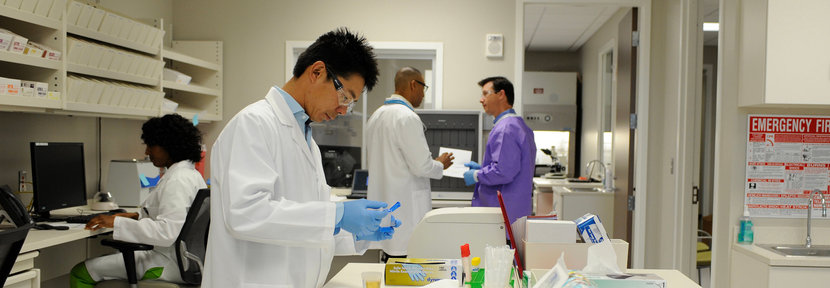Lesedauer von 2 Min.
10. September 2024
GEMEINSCHAFT UND GLOBALE GESUNDHEIT
Geschichte über Auswirkungen
Finnisches Krankenhaus verbessert die Versorgung von werdenden Müttern mit GBS-PCR-Screening
Die Kätilöopisto Frauenklinik in Helsinki führte ein universelles PCR-Screening auf Streptokokkeninfektionen der Gruppe B (GBS) bei werdenden Müttern mit dem Cepheid GeneXpert®-System durch. Mit positiven GBS-Ergebnissen, die in 36–56 Minuten verfügbar sind, beseitigt das Team die Unsicherheit über den Gesundheitsstatus, die bei der vorherigen risikobasierten Bewertung vorhanden war. Ein universelles intrapartales PCR-Screening war mit einer Reduzierung der Krankenhausaufenthaltsdauer von Neugeborenen um etwa 1 Tag assoziiert.
Eine Streptokokkeninfektion der Gruppe B (GBS) ist die Hauptursache für Early-Onset-Erkrankungen (EOD, Early Onset Disease) bei Neugeborenen. Wenn die Mutter mit GBS besiedelt ist, können sie im Geburtskanal von der Mutter auf das Baby übertragen werden. Die Verabreichung von Antibiotika für werdende Mütter während des Entbindungsprozesses ist wirksam bei der Prävention der GBS-Übertragung und einer möglichen nachfolgenden EOD bei Neugeborenen. Allerdings fand es die Frauenklinik Kätilöopisto schwierig, schnell und genau zu bestimmen, welche Frauen prophylaktische Antibiotika erhalten sollten.
In der Vergangenheit verwendete das Krankenhaus eine risikobasierte Beurteilung, um zu bestimmen, welche Frauen zum Zeitpunkt der Geburt eine intrapartale Antibiotikaprophylaxe (IAP) erhalten sollten. Die Beurteilung berücksichtigte Risikofaktoren wie vorzeitiger Blasensprung um mehr als 18 Stunden, eine Vorgeschichte einer GBS-positiven Vaginal- oder Urinkultur zu einem früheren Zeitpunkt während der Schwangerschaft oder eine vorherige Geburt, bei der das Kind GBS-EOD entwickelte. In den letzten Jahren wurden jedoch Zweifel an der Effizienz der risikobasierten IAP geweckt. Laut der Bewertung haben manche Mütter zum Beispiel keine Risikofaktoren, könnten aber dennoch positiv für GBS sein. Andererseits könnten einige Mütter viele Risikofaktoren haben, aber nicht GBS-positiv sein, was dazu führt, dass sie unnötig Antibiotika erhalten.
Die Frauenklinik Kätilöopisto in Helsinki benötigte eine präzise und schnelle Methode zum Nachweis einer GBS-Besiedlung bei werdenden Müttern zur Unterstützung von Bemühungen zum verantwortungsvollen Umgang mit Antibiotika, zur Reduzierung der Inzidenzraten von Early-Onset-Erkrankungen bei Neugeborenen und zur Reduzierung der Zeit, die Neugeborene stationär aufgenommen werden müssen.
Eine an der Frauenklinik Kätilöopisto durchgeführte Studie im Jahr 2014 belegte den Mehrwert eines universellen intrapartalen PCR-Screenings auf GBS unter Verwendung des Xpert® GBS-Tests im Vergleich zur risikobasierten Bewertung auf IAP in der Standardpraxis. Universelle intrapartale PCR-Tests waren mit einer Reduzierung der Aufenthaltsdauer von Neugeborenen um 1,13 Tage assoziiert, ohne dass der Antibiotikaeinsatz zunahm. Darüber hinaus gab es bei intrapartalen Tests keine Fälle von EOD im Vergleich zu 3 Fällen, in denen eine risikobasierte Beurteilung verwendet wurde.
Literaturhinweis:
Björklund, V., Nieminen, T., Ulander, V. M., Ahola, T., & Saxén, H. (2017). Replacing risk-based early-onset-disease prevention with intrapartum group B streptococcus PCR testing. The journal of maternal-fetal & neonatal medicine : the official journal of the European Association of Perinatal Medicine, the Federation of Asia and Oceania Perinatal Societies, the International Society of Perinatal Obstetricians, 30(3), 368–373.
Nächsten Artikel lesen
MEHR







